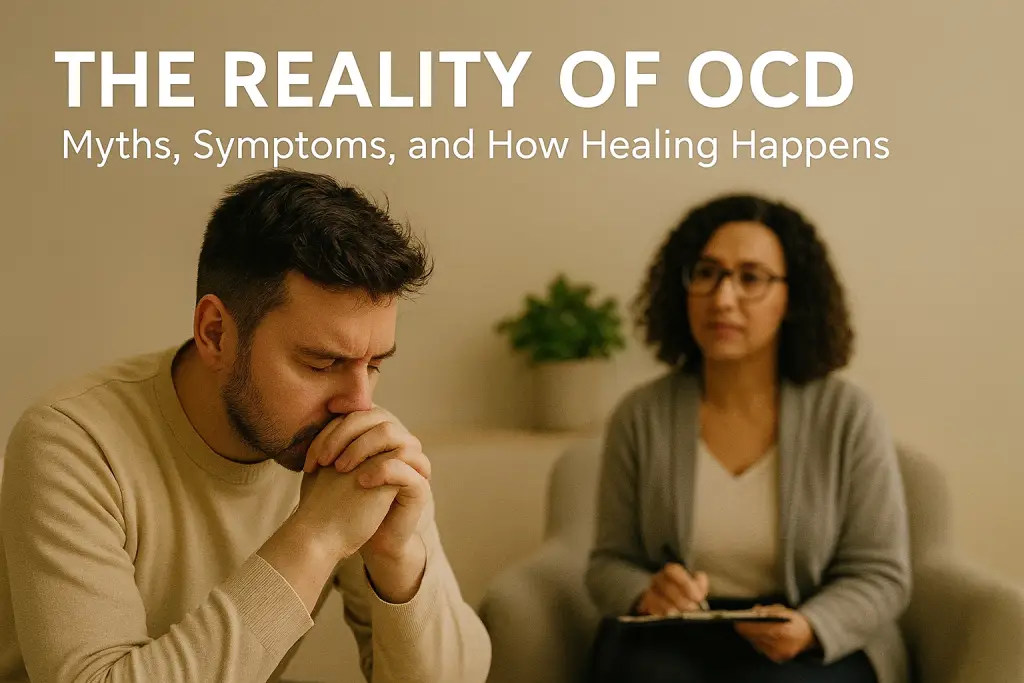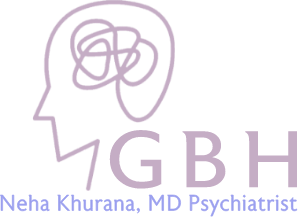
- October 31, 2025
The Reality of OCD: Myths, Symptoms, and How Healing Happens
Obsessive-Compulsive Disorder (OCD) is often misunderstood. Pop culture has reduced it to a personality trait, a love of order, or an obsession with cleanliness, when in reality, OCD is a complex anxiety disorder that affects millions of people worldwide.
These portrayals not only minimize the distress OCD causes but also discourage individuals from seeking help. October, recognized as OCD Awareness Month, reminds us of the importance of accurate understanding, empathy, and early intervention.
At Georgia Behavioral Health, we’re here to shed light on the reality of OCD, its symptoms, myths, and how healing truly happens with the right treatment and support.
What Is OCD?
Obsessive-Compulsive Disorder (OCD) is a mental health condition defined by two key components:
- Obsessions – Intrusive, unwanted thoughts, images, or urges that trigger anxiety or distress.
- Compulsions – Repetitive behaviors or mental rituals done to relieve the anxiety caused by obsessions.
These cycles of fear and relief can take up hours of a person’s day, affecting their work, relationships, and emotional well-being.
One Conversation Can Change Everything! Consult Dr. Neha Khurana for OCD treatment
Common Obsessions:
- Fear of contamination or germs
- Fear of harming oneself or others
- Fear of making mistakes or being immoral
- Unwanted sexual or violent thoughts
Common Compulsions:
- Repeated handwashing or cleaning
- Checking locks, appliances, or safety measures
- Counting, repeating words, or praying to “neutralize” bad thoughts
- Mentally reviewing situations for reassurance
No two people experience OCD the same way, some primarily have intrusive thoughts, while others have visible compulsions.
Myths and Misconceptions About OCD
Myth 1: “OCD is just about being clean or organized.”
Not everyone with OCD struggles with cleanliness. Many experience intrusive fears or mental rituals that have nothing to do with germs or tidiness.
Myth 2: “People with OCD can just stop if they try harder.”
OCD is not a willpower problem. Compulsions are driven by intense anxiety, and resisting them without help can lead to panic or distress.
Myth 3: “OCD is rare.”
According to the Anxiety & Depression Association of America (ADAA), OCD affects about 2–3% of the population, that’s millions of people globally. Many go undiagnosed due to stigma and misunderstanding.
Myth 4: “OCD isn’t serious.”
Untreated OCD can lead to severe anxiety, depression, and impairment in daily life. It’s a legitimate mental health disorder, not a personality quirk.
The Connection Between OCD, Anxiety, and Depression
Living with OCD can be mentally exhausting. The constant cycle of intrusive thoughts and repetitive behaviors drains energy and creates feelings of guilt, frustration, and hopelessness.
It’s common for people with OCD to also experience anxiety, depression, or eating disorders. The overlap (called comorbidity) can intensify symptoms, making it even harder to break free from the cycle without professional care.
Treatment that addresses both OCD and co-occurring conditions helps individuals regain emotional balance and resilience.
How Healing Happens: Effective Treatments for OCD
The good news: OCD is highly treatable with evidence-based therapies and integrated care.
1. Cognitive Behavioral Therapy (CBT) with Exposure and Response Prevention (ERP)
ERP is the gold standard treatment for OCD. It teaches individuals to face their fears gradually and resist compulsions, helping the brain learn that anxiety naturally decreases without the ritual.
2. Medication Management
Selective Serotonin Reuptake Inhibitors (SSRIs) and other medications can reduce intrusive thoughts and compulsive urges by balancing serotonin levels in the brain.
3. Integrated Psychiatric Care
At Georgia Behavioral Health, our psychiatrists and clinicians collaborate to provide personalized treatment that may include therapy, medication, and advanced options like Spravato® IV Ketamine, or TMS therapy for coexisting depression or anxiety.
4. Mindfulness and Self-Compassion
Learning to observe intrusive thoughts without judgment helps individuals loosen OCD’s grip. Mindfulness and compassion-based strategies support emotional regulation and long-term healing.
One Conversation Can Change Everything! Consult Dr. Neha Khurana for OCD treatment
How to Support a Loved One with OCD
Your support can make a meaningful difference in someone’s recovery.
- Educate yourself: Learn about OCD to avoid reinforcing harmful stereotypes.
- Listen without judgment: Intrusive thoughts can be difficult to share, empathy goes a long way.
- Encourage professional help: Therapy and medication can dramatically reduce symptoms.
- Avoid enabling compulsions: Reassuring or assisting in rituals can unintentionally strengthen them. Instead, support their therapy goals with patience.
Key Takeaways
- OCD is not a personality trait, it’s a real, treatable anxiety disorder.
- Obsessions and compulsions feed each other in a cycle that requires structured care to break.
- ERP therapy, medication, and integrated psychiatric care are proven treatments.
- Depression and anxiety often occur alongside OCD, but recovery is absolutely possible.
- Compassion and awareness are the first steps to ending stigma.
About Georgia Behavioral Health
At Georgia Behavioral Health, we provide compassionate, science-driven psychiatric care to help individuals find lasting relief from OCD, anxiety, and depression.
Our approach blends psychotherapy, medication management, and innovative treatments to create personalized care plans that promote long-term healing.
Frequently Asked Questions (FAQ)
Is OCD curable?
OCD is typically a chronic condition, but it’s highly manageable. With treatment, many people experience long-term relief and remission.
What causes OCD?
Research shows that OCD involves a mix of genetic, biological, and environmental factors. Stress can worsen symptoms, but it does not cause OCD by itself.
What type of therapy helps most with OCD?
Exposure and Response Prevention (ERP), a form of CBT, is the most effective therapy. It teaches you to tolerate uncertainty and reduce compulsions over time.
Can medication help with OCD?
Yes. SSRIs and similar medications help regulate serotonin, reduce intrusive thoughts, and make therapy more effective.
How can I tell if it’s OCD or anxiety?
While both involve worry, OCD includes repetitive rituals or mental behaviors done to relieve anxiety, a key distinction.
Can OCD and depression occur together?
Yes. Many people experience both conditions. Integrated care helps treat both simultaneously for better results.
How do I support someone with OCD?
Be patient, avoid minimizing their fears, and encourage professional help. Avoid participating in rituals, as it can reinforce the OCD cycle.
